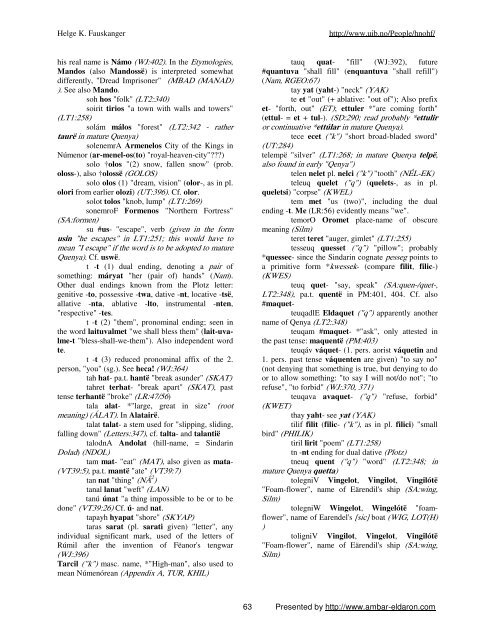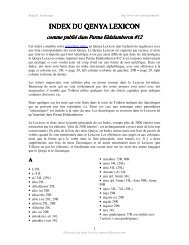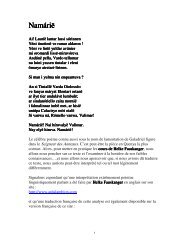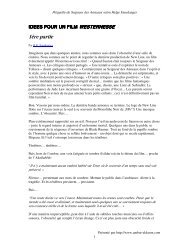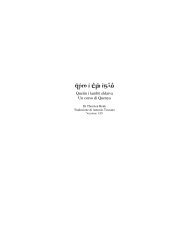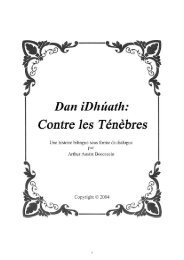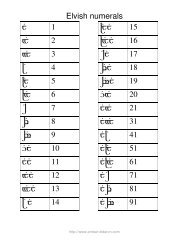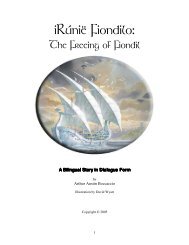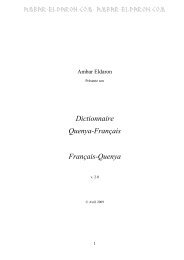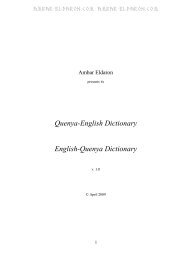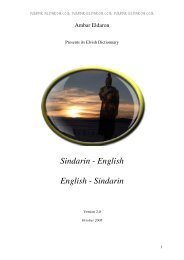Quenya Reverse Wordlist - Ambar Eldaron
Quenya Reverse Wordlist - Ambar Eldaron
Quenya Reverse Wordlist - Ambar Eldaron
Create successful ePaper yourself
Turn your PDF publications into a flip-book with our unique Google optimized e-Paper software.
Helge K. Fauskanger http://www.uib.no/People/hnohf/<br />
his real name is Námo (WJ:402). In the Etymologies,<br />
Mandos (also Mandossë) is interpreted somewhat<br />
differently, "Dread Imprisoner" (MBAD (MANAD)<br />
). See also Mando.<br />
soh hos "folk" (LT2:340)<br />
soirit tirios "a town with walls and towers"<br />
(LT1:258)<br />
solám málos "forest" (LT2:342 - rather<br />
taurë in mature <strong>Quenya</strong>)<br />
solenemrA Armenelos City of the Kings in<br />
Númenor (ar-menel-os(to) "royal-heaven-city"???)<br />
solo †olos "(2) snow, fallen snow" (prob.<br />
oloss-), also †olossë (GOLOS)<br />
solo olos (1) "dream, vision" (olor-, as in pl.<br />
olori from earlier olozi) (UT:396). Cf. olor.<br />
solot tolos "knob, lump" (LT1:269)<br />
sonemroF Formenos "Northern Fortress"<br />
(SA:formen)<br />
su #us- "escape", verb (given in the form<br />
usin "he escapes" in LT1:251; this would have to<br />
mean "I escape" if the word is to be adopted to mature<br />
<strong>Quenya</strong>). Cf. uswë.<br />
t -t (1) dual ending, denoting a pair of<br />
something: máryat "her (pair of) hands" (Nam).<br />
Other dual endings known from the Plotz letter:<br />
genitive -to, possessive -twa, dative -nt, locative -tsë,<br />
allative -nta, ablative -lto, instrumental -nten,<br />
"respective" -tes.<br />
t -t (2) "them", pronominal ending; seen in<br />
the word laituvalmet "we shall bless them" (lait-uvalme-t<br />
"bless-shall-we-them"). Also independent word<br />
te.<br />
t -t (3) reduced pronominal affix of the 2.<br />
person, "you" (sg.). See heca! (WJ:364)<br />
tah hat- pa.t. hantë "break asunder" (SKAT)<br />
tahret terhat- "break apart" (SKAT), past<br />
tense terhantë "broke" (LR:47/56)<br />
tala alat- *"large, great in size" (root<br />
meaning) (ÁLAT). In Alatairë.<br />
talat talat- a stem used for "slipping, sliding,<br />
falling down" (Letters:347), cf. talta- and talantië<br />
talodnA Andolat (hill-name, = Sindarin<br />
Dolad) (NDOL)<br />
tam mat- "eat" (MAT), also given as mata-<br />
(VT39:5), pa.t. mantë "ate" (VT39:7)<br />
tan nat "thing" (NÂ 2 )<br />
tanal lanat "weft" (LAN)<br />
tanú únat "a thing impossible to be or to be<br />
done" (VT39:26) Cf. ú- and nat.<br />
tapayh hyapat "shore" (SKYAP)<br />
taras sarat (pl. sarati given) "letter", any<br />
individual significant mark, used of the letters of<br />
Rúmil after the invention of Fëanor's tengwar<br />
(WJ:396)<br />
Tarcil ("k") masc. name, *"High-man", also used to<br />
mean Númenórean (Appendix A, TUR, KHIL)<br />
63<br />
tauq quat- "fill" (WJ:392), future<br />
#quantuva "shall fill" (enquantuva "shall refill")<br />
(Nam, RGEO:67)<br />
tay yat (yaht-) "neck" (YAK)<br />
te et "out" (+ ablative: "out of"); Also prefix<br />
et- "forth, out" (ET); ettuler *"are coming forth"<br />
(ettul- = et + tul-). (SD:290; read probably *ettulir<br />
or continuative *ettúlar in mature <strong>Quenya</strong>).<br />
tece ecet ("k") "short broad-bladed sword"<br />
(UT:284)<br />
telempë "silver" (LT1:268; in mature <strong>Quenya</strong> telpë,<br />
also found in early "Qenya")<br />
telen nelet pl. nelci ("k") "tooth" (NÉL-EK)<br />
teleuq quelet ("q") (quelets-, as in pl.<br />
queletsi) "corpse" (KWEL)<br />
tem met "us (two)", including the dual<br />
ending -t. Me (LR:56) evidently means "we".<br />
temorO Oromet place-name of obscure<br />
meaning (Silm)<br />
teret teret "auger, gimlet" (LT1:255)<br />
tesseuq quesset ("q") "pillow"; probably<br />
*quessec- since the Sindarin cognate pesseg points to<br />
a primitive form *kwessek- (compare filit, filic-)<br />
(KWES)<br />
teuq quet- "say, speak" (SA:quen-/quet-,<br />
LT2:348), pa.t. quentë in PM:401, 404. Cf. also<br />
#maquet-<br />
teuqadlE Eldaquet ("q") apparently another<br />
name of Qenya (LT2:348)<br />
teuqam #maquet- *"ask", only attested in<br />
the past tense: maquentë (PM:403)<br />
teuqáv váquet- (1. pers. aorist váquetin and<br />
1. pers. past tense váquenten are given) "to say no"<br />
(not denying that something is true, but denying to do<br />
or to allow something: "to say I will not/do not"; "to<br />
refuse", "to forbid" (WJ:370, 371)<br />
teuqava avaquet- ("q") "refuse, forbid"<br />
(KWET)<br />
thay yaht- see yat (YAK)<br />
tilif filit (filic- ("k"), as in pl. filici) "small<br />
bird" (PHILIK)<br />
tiril lirit "poem" (LT1:258)<br />
tn -nt ending for dual dative (Plotz)<br />
tneuq quent ("q") "word" (LT2:348; in<br />
mature <strong>Quenya</strong> quetta)<br />
tolegniV Vingelot, Vingilot, Vingilótë<br />
"Foam-flower", name of Eärendil's ship (SA:wing,<br />
Silm)<br />
tolegniW Wingelot, Wingelótë "foamflower",<br />
name of Earendel's [sic] boat (WIG, LOT(H)<br />
)<br />
toligniV Vingilot, Vingelot, Vingilótë<br />
"Foam-flower", name of Eärendil's ship (SA:wing,<br />
Silm)<br />
Presented by http://www.ambar-eldaron.com


